A mono behaviour state-machine that can also be used as a state More...
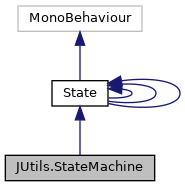
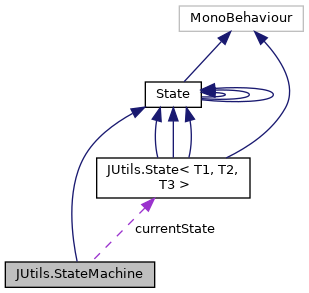
Classes | |
| struct | QueueEntry |
| Representation of the state and its data in the queue More... | |
Public Member Functions | |
| void | GoToState ([NotNull] State state, [CanBeNull] StateData data) |
| Queues the current given state, then goes to it More... | |
| void | GoToState< T > ([CanBeNull] StateData data) |
| Clears the StateQueue and goes to the given state More... | |
| void | AddToQueue ([NotNull] State state, [CanBeNull] StateData data, bool queueFirst=false) |
| Adds a new state to the queue More... | |
| void | AddToQueue< T > ([CanBeNull] StateData data, bool queueFirst=false) |
| Adds a new state to the queue More... | |
| void | ClearQueue () |
| Clears all states in the queue More... | |
| void | ContinueQueue () |
| Deactivate the current state and go to the next one More... | |
| T | FindState< T > () |
| Find a state within the child objects of this state-machine, if _autoCreateStates is enabled, it will automatically instantiate the state More... | |
| bool | TryFindState< T > (out T state) |
| Try finding a state within the child objects of this state-machine, if _autoCreateStates is enabled, it will automatically instantiate that state More... | |
| void | Activate ([CanBeNull] StateData data=null) |
| Activates the state machine More... | |
| new void | Deactivate () |
| Continues the queue in the state machine, or deactivates the state if it is the root state machine More... | |
| void | GoToState (State state) |
| Clears the StateQueue and goes to the given state More... | |
| void | GoToState< T, T1 > (T state, T1 arg1) |
| Clears the StateQueue and goes to the given state More... | |
| void | GoToState< T, T1, T2 > (T state, T1 arg1, T2 arg2) |
| Clears the StateQueue and goes to the given state More... | |
| void | GoToState< T, T1, T2, T3 > (T state, T1 arg1, T2 arg2, T3 arg3) |
| Clears the StateQueue and goes to the given state More... | |
| void | GoToState< T > () |
| Adds a new state to the queue More... | |
| void | GoToState< T, T1 > (T1 arg1) |
| Clears the StateQueue and goes to the given state More... | |
| void | GoToState< T, T1, T2 > (T1 arg1, T2 arg2) |
| Clears the StateQueue and goes to the given state More... | |
| void | GoToState< T, T1, T2, T3 > (T1 arg1, T2 arg2, T3 arg3) |
| Clears the StateQueue and goes to the given state More... | |
| void | GoToState< T, T1, T2, T3 > (StateRef< T > stateRef, T1 arg1, T2 arg2, T3 arg3) |
| Adds a new state to the queue More... | |
| void | GoToState< T, T1, T2 > (StateRef< T > stateRef, T1 arg1, T2 arg2) |
| Adds a new state to the queue More... | |
| void | GoToState< T, T1 > (StateRef< T > stateRef, T1 arg1) |
| Adds a new state to the queue More... | |
| void | GoToState< T > (StateRef< T > stateRef) |
| Adds a new state to the queue More... | |
| void | AddToQueue< T > (T state, bool queueFist=false) |
| Adds a new state to the queue More... | |
| void | AddToQueue< T, T1 > (T state, T1 arg1, bool queueFist=false) |
| Adds a new state to the queue More... | |
| void | AddToQueue< T, T1, T2 > (T state, T1 arg1, T2 arg2, bool queueFist=false) |
| Adds a new state to the queue More... | |
| void | AddToQueue< T, T1, T2, T3 > (T state, T1 arg1, T2 arg2, T3 arg3, bool queueFirst=false) |
| Adds a new state to the queue More... | |
| void | AddToQueue< T > (bool queueFist=false) |
| Adds a new state to the queue More... | |
| void | AddToQueue< T, T1 > (T1 arg1, bool queueFirst=false) |
| Adds a new state to the queue More... | |
| void | AddToQueue< T, T1, T2 > (T1 arg1, T2 arg2, bool queueFirst=false) |
| Adds a new state to the queue More... | |
| void | AddToQueue< T, T1, T2, T3 > (T1 arg1, T2 arg2, T3 arg3, bool queueFirst=false) |
| Adds a new state to the queue More... | |
| void | AddToQueue< T, T1, T2, T3 > (StateRef< T > stateRef, T1 arg1, T2 arg2, T3 arg3, bool queueFirst=false) |
| Adds a new state to the queue More... | |
| void | AddToQueue< T, T1, T2 > (StateRef< T > stateRef, T1 arg1, T2 arg2, bool queueFirst=false) |
| Adds a new state to the queue More... | |
| void | AddToQueue< T, T1 > (StateRef< T > stateRef, T1 arg1, bool queueFirst=false) |
| Adds a new state to the queue More... | |
| void | AddToQueue< T > (StateRef< T > stateRef, bool queueFirst=false) |
| Adds a new state to the queue More... | |
Protected Member Functions | |
| abstract void | OnNoState () |
| Gets called when there is no next state in the queue More... | |
| override void | Awake () |
| virtual void | Start () |
| virtual void | Reset () |
| virtual void | OnValidate () |
 Protected Member Functions inherited from JUtils.State< T1, T2, T3 > Protected Member Functions inherited from JUtils.State< T1, T2, T3 > | |
| void | Deactivate () |
| Deactivate this state and make the state-machine continue its queue More... | |
| abstract void | OnActivate () |
| Gets called when the state activates More... | |
| abstract void | OnDeactivate () |
| Gets called when the sate deactivates More... | |
| StateRef< T > | Ref< T > () |
| Used for making typed argument adding to states prettier More... | |
| virtual void | ActiveUpdate () |
| Only runs the Update() function when the state is active More... | |
| virtual void | Update () |
| override void | OnActivate () |
| abstract void | OnActivate (T param) |
| override void | OnActivate () |
| abstract void | OnActivate (T1 param1, T2 param2) |
| override void | OnActivate () |
| abstract void | OnActivate (T1 param1, T2 param2, T3 param3) |
Protected Attributes | |
| State | currentState |
| List< QueueEntry > | stateQueue = new() |
Properties | |
| bool | hasActiveState [get] |
| bool | isQueueFilled [get] |
| bool | isQueueEmpty [get] |
| new StateMachine | stateMachine [get] |
 Properties inherited from JUtils.State< T1, T2, T3 > Properties inherited from JUtils.State< T1, T2, T3 > | |
| bool | isActive [get] |
| bool | isActivating [get] |
| Is set to true while the state is activating More... | |
| bool | isDeactivating [get] |
| Is set to true while the state is deactivating More... | |
| StateMachine | stateMachine [get, set] |
| The reference of this state's state machine More... | |
| float | timeInState [get] |
| Get the amount of seconds that this state is active. Returns 0 if the state is not active More... | |
| float | unscaledTimeInState [get] |
| Get the amount of unscaled seconds that this state is active. Returns 0 if the state is not active More... | |
| StateData | stateData [get] |
Events | |
| Action< State > | onStateChanged |
 Events inherited from JUtils.State< T1, T2, T3 > Events inherited from JUtils.State< T1, T2, T3 > | |
| Action< State > | onStateActivate |
| Action< State > | onStateDeactivate |
Detailed Description
A mono behaviour state-machine that can also be used as a state
Member Function Documentation
◆ Activate()
|
inline |
Activates the state machine
References JUtils.State< T1, T2, T3 >.isActive.
◆ AddToQueue()
|
inline |
Adds a new state to the queue
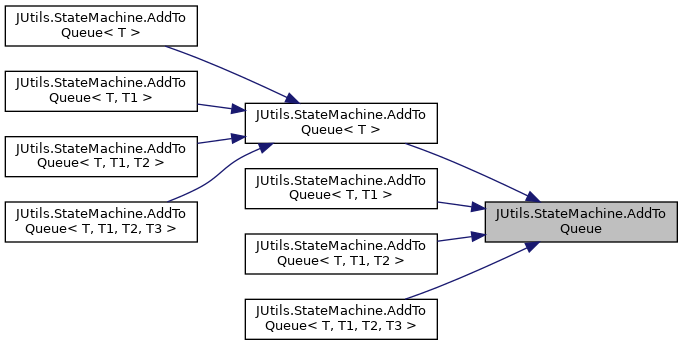
◆ AddToQueue< T >() [1/4]
|
inline |
Adds a new state to the queue
- Type Constraints
-
T : State
References JUtils.StateMachine.AddToQueue().

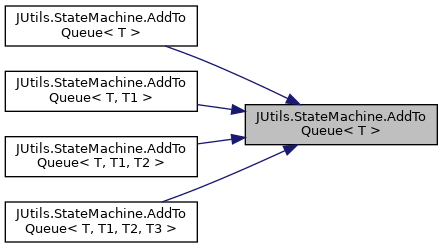
◆ AddToQueue< T >() [2/4]
|
inline |
Adds a new state to the queue
- Type Constraints
-
T : State
References JUtils.StateMachine.AddToQueue< T >().

◆ AddToQueue< T >() [3/4]
|
inline |
Adds a new state to the queue
- Type Constraints
-
T : State
References JUtils.StateMachine.AddToQueue< T >().

◆ AddToQueue< T >() [4/4]
|
inline |
Adds a new state to the queue
- Type Constraints
-
T : State
References JUtils.StateMachine.AddToQueue().

◆ AddToQueue< T, T1 >() [1/3]
|
inline |
Adds a new state to the queue
- Type Constraints
-
T : State<T1>
References JUtils.StateMachine.AddToQueue< T >().

◆ AddToQueue< T, T1 >() [2/3]
|
inline |
Adds a new state to the queue
- Type Constraints
-
T : State<T1>
References JUtils.StateMachine.AddToQueue().

◆ AddToQueue< T, T1 >() [3/3]
|
inline |
Adds a new state to the queue
- Type Constraints
-
T : State<T1>
References JUtils.StateMachine.AddToQueue< T >().

◆ AddToQueue< T, T1, T2 >() [1/3]
|
inline |
Adds a new state to the queue
- Type Constraints
-
T : State T : T1 T : T2
References JUtils.StateMachine.AddToQueue< T >().

◆ AddToQueue< T, T1, T2 >() [2/3]
|
inline |
Adds a new state to the queue
- Type Constraints
-
T : State T : T1 T : T2
References JUtils.StateMachine.AddToQueue().

◆ AddToQueue< T, T1, T2 >() [3/3]
|
inline |
Adds a new state to the queue
- Type Constraints
-
T : State T : T1 T : T2
References JUtils.StateMachine.AddToQueue< T >().

◆ AddToQueue< T, T1, T2, T3 >() [1/3]
|
inline |
Adds a new state to the queue
- Type Constraints
-
T : State T : T1 T : T2 T : T3
References JUtils.StateMachine.AddToQueue< T >().

◆ AddToQueue< T, T1, T2, T3 >() [2/3]
|
inline |
Adds a new state to the queue
- Type Constraints
-
T : State T : T1 T : T2 T : T3
References JUtils.StateMachine.AddToQueue().

◆ AddToQueue< T, T1, T2, T3 >() [3/3]
|
inline |
Adds a new state to the queue
- Type Constraints
-
T : State T : T1 T : T2 T : T3
References JUtils.StateMachine.AddToQueue< T >().

◆ Awake()
|
inlineprotectedvirtual |
Reimplemented from JUtils.State< T1, T2, T3 >.
◆ ClearQueue()
|
inline |
Clears all states in the queue
References JUtils.StateMachine.stateQueue.
◆ ContinueQueue()
|
inline |
Deactivate the current state and go to the next one
References JUtils.StateMachine.currentState, JUtils.StateMachine.QueueEntry.data, JUtils.State< T1, T2, T3 >.isActive, JUtils.StateMachine.isQueueFilled, JUtils.StateMachine.OnNoState(), JUtils.StateMachine.onStateChanged, JUtils.StateMachine.QueueEntry.state, JUtils.State< T1, T2, T3 >.stateMachine, and JUtils.StateMachine.stateQueue.

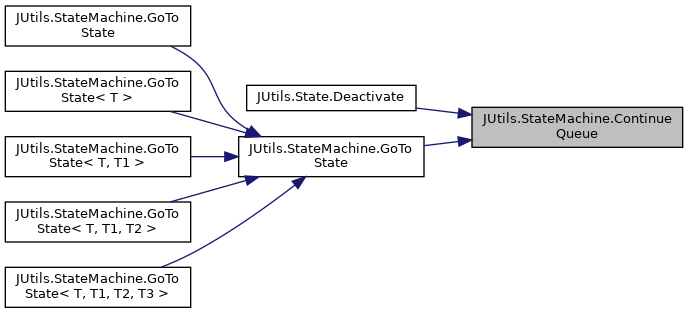
◆ Deactivate()
|
inline |
Continues the queue in the state machine, or deactivates the state if it is the root state machine
References JUtils.State< T1, T2, T3 >.isActive, and JUtils.StateMachine.stateMachine.
◆ FindState< T >()
|
inline |
Find a state within the child objects of this state-machine, if _autoCreateStates is enabled, it will automatically instantiate the state
- Type Constraints
-
T : State
◆ GoToState() [1/2]
Queues the current given state, then goes to it
References JUtils.StateMachine.ContinueQueue().

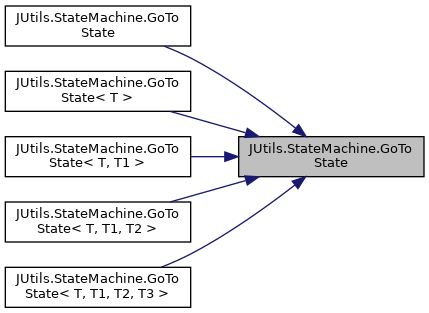
◆ GoToState() [2/2]
|
inline |
Clears the StateQueue and goes to the given state
References JUtils.StateMachine.GoToState().

◆ GoToState< T >() [1/3]
|
inline |
Adds a new state to the queue
- Type Constraints
-
T : State
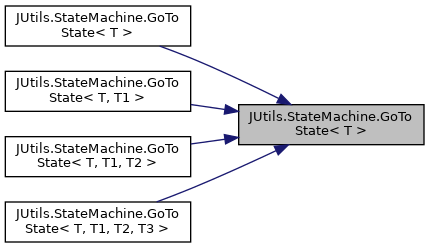
◆ GoToState< T >() [2/3]
|
inline |
Clears the StateQueue and goes to the given state
- Type Constraints
-
T : State
References JUtils.StateMachine.GoToState().

◆ GoToState< T >() [3/3]
|
inline |
Adds a new state to the queue
- Type Constraints
-
T : State
References JUtils.StateMachine.GoToState< T >().

◆ GoToState< T, T1 >() [1/3]
|
inline |
Adds a new state to the queue
- Type Constraints
-
T : State<T1>
References JUtils.StateMachine.GoToState< T >().

◆ GoToState< T, T1 >() [2/3]
|
inline |
Clears the StateQueue and goes to the given state
- Type Constraints
-
T : State<T1>
References JUtils.StateMachine.GoToState().

◆ GoToState< T, T1 >() [3/3]
|
inline |
Clears the StateQueue and goes to the given state
- Type Constraints
-
T : State<T1>
References JUtils.StateMachine.GoToState< T >().

◆ GoToState< T, T1, T2 >() [1/3]
|
inline |
Adds a new state to the queue
- Type Constraints
-
T : State T : T1 T : T2
References JUtils.StateMachine.GoToState< T >().

◆ GoToState< T, T1, T2 >() [2/3]
|
inline |
Clears the StateQueue and goes to the given state
- Type Constraints
-
T : State T : T1 T : T2
References JUtils.StateMachine.GoToState().

◆ GoToState< T, T1, T2 >() [3/3]
|
inline |
Clears the StateQueue and goes to the given state
- Type Constraints
-
T : State T : T1 T : T2
References JUtils.StateMachine.GoToState< T >().

◆ GoToState< T, T1, T2, T3 >() [1/3]
|
inline |
Adds a new state to the queue
- Type Constraints
-
T : State T : T1 T : T2 T : T3
References JUtils.StateMachine.GoToState< T >().

◆ GoToState< T, T1, T2, T3 >() [2/3]
|
inline |
Clears the StateQueue and goes to the given state
- Type Constraints
-
T : State T : T1 T : T2 T : T3
References JUtils.StateMachine.GoToState().

◆ GoToState< T, T1, T2, T3 >() [3/3]
|
inline |
Clears the StateQueue and goes to the given state
- Type Constraints
-
T : State T : T1 T : T2 T : T3
References JUtils.StateMachine.GoToState< T >().

◆ OnNoState()
|
protectedpure virtual |
Gets called when there is no next state in the queue
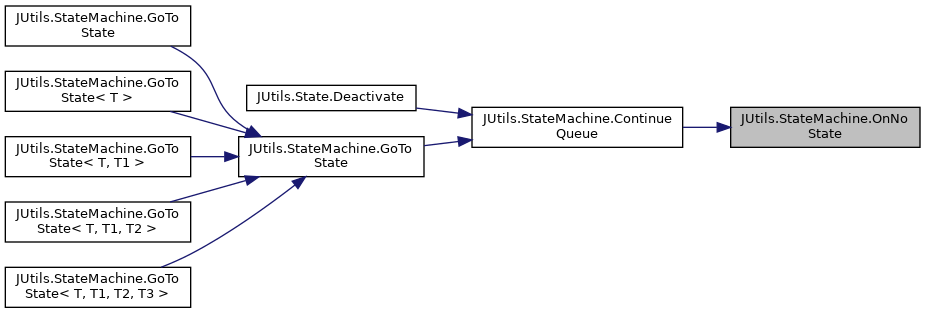
◆ OnValidate()
|
inlineprotectedvirtual |
◆ Reset()
|
inlineprotectedvirtual |
◆ Start()
|
inlineprotectedvirtual |
References JUtils.State< T1, T2, T3 >.isActive.
◆ TryFindState< T >()
|
inline |
Try finding a state within the child objects of this state-machine, if _autoCreateStates is enabled, it will automatically instantiate that state
- Type Constraints
-
T : State
Member Data Documentation
◆ currentState
|
protected |
◆ stateQueue
|
protected |
Property Documentation
◆ hasActiveState
|
get |
◆ isQueueEmpty
|
get |
◆ isQueueFilled
|
get |
◆ stateMachine
|
get |
Event Documentation
◆ onStateChanged
| Action<State> JUtils.StateMachine.onStateChanged |
The documentation for this class was generated from the following files: